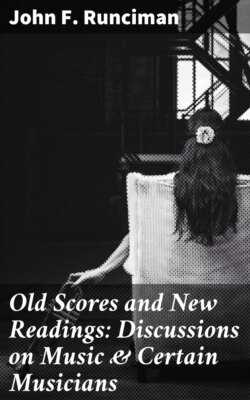Читать книгу Old Scores and New Readings: Discussions on Music & Certain Musicians - John F. Runciman - Страница 10
На сайте Литреса книга снята с продажи.
VI.
ОглавлениеTable of Contents
Purcell is also a chief, though not the chief, among song-writers. And he stands in the second place by reason of the very faculty which places him amongst the first of instrumental and choral writers. That dominating picturesque power of his, that tendency to write picturesque melodies as well as picturesque movements, compelled him to treat the voice as he treated any other instrument, and he writes page on page which would be at least as effective on any other instrument; and as more can be got out of the voice than out of any other instrument, and the tip-top song-writers got all out that could be got out, it follows that Purcell is below them. But only the very greatest of them have beaten him, and he often, by sheer perfection of phrase, runs them very close. Still, Mozart, Bach, and Handel do move us more profoundly. And an odd demonstration that Purcell the instrumental writer is almost above Purcell the composer for the voice, is that in such songs as "Halcyon Days" (in "The Tempest") the same phrases are perhaps less grateful on the voice than when repeated by the instrument. The phrase "That used to lull thee in thy sleep" (in "The Indian Queen") is divine when sung, but how thrilling is its touching expressiveness, how it seems to speak when the 'cellos repeat it! There are, of course, truly vocal melodies in Purcell (as there are in Beethoven and Berlioz, who also were not great writers for the voice), and some of them might almost be Mozart's. The only difference that may be felt between "While joys celestial" ("Cecilia Ode" of 1683) and a Mozart song, is that in Mozart one gets the frequent human touch, and in Purcell the frequent suggestion of the free winds and scented blossoms. The various scattered songs, such as "Mad Tom" (which is possibly not Purcell's at all) or "Mad Bess" (which certainly is), I have no room to discuss; but I may remark that the madness was merely an excuse for exhibiting a series of passions in what was reckoned at the time a natural manner. Quite possibly it was then thought that in a spoken play only mad persons should sing, just as Wagner insists that in music-drama only mad persons should speak; and as a good deal of singing was required, there were a good many mad parts. Probably Purcell would have treated all Wagner's characters, and all Berlioz's, as utterly and irretrievably mad. Nor have I space to discuss his instrumental music and his instrumentation, but must refer shortly to the fact that the overtures to the plays are equal to Handel's best in point of grandeur, and that in freedom, quality of melody, and daring, and fruitful use of new harmonies, the sonatas are ahead of anything attempted until Mozart came. They cannot be compared to Bach's suites, and they are infinitely fresher than the writings of the Italians whom he imitated. As for Purcell's instrumentation, it is primitive compared to Mozart's, but when he uses the instrument in group or batteries he obtains gorgeous effects of varied colour. He gets delicious effects by means of obligato instrumental parts in the accompaniments to such songs as "Charon the Peaceful Shade Invites"; and those who have heard the "Te Deum" in D may remember that even Bach never got more wonderful results from the sweeter tones of the trumpet.
